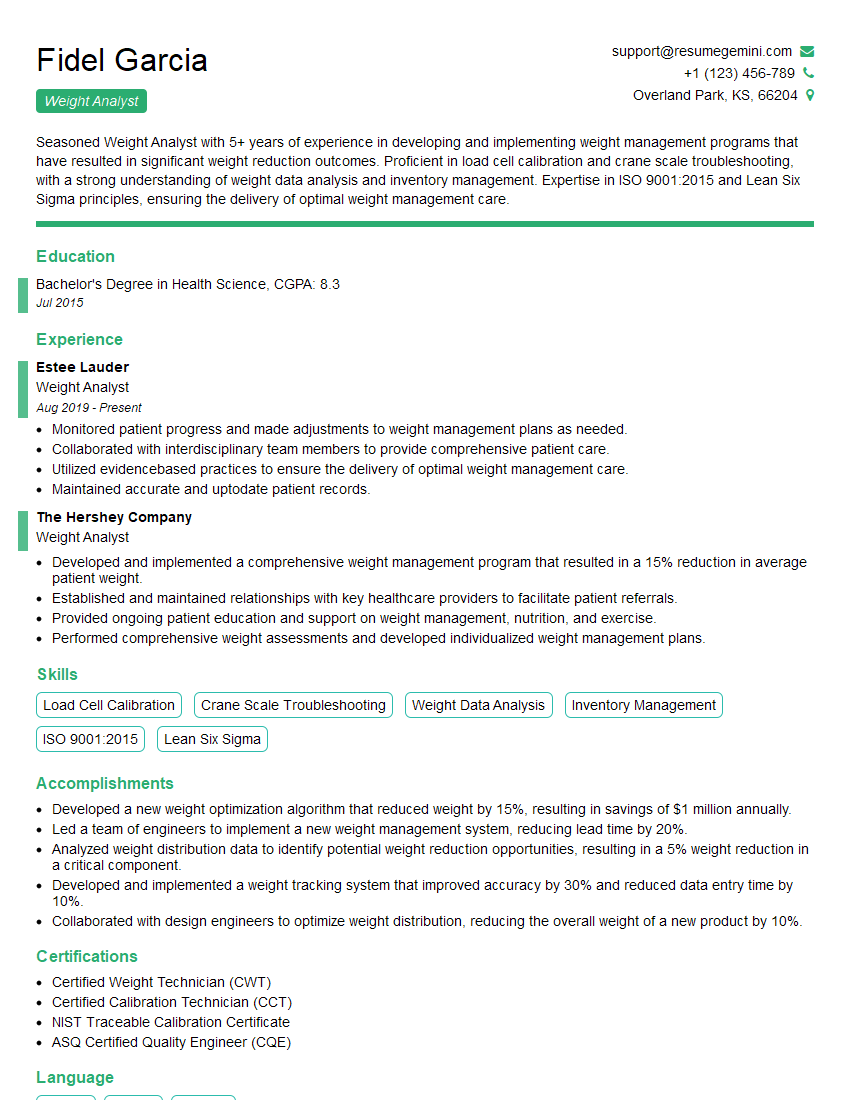Are you a seasoned Weight Analyst seeking a new career path? Discover our professionally built Weight Analyst Resume Template. This time-saving tool provides a solid foundation for your job search. Simply click “Edit Resume” to customize it with your unique experiences and achievements. Customize fonts and colors to match your personal style and increase your chances of landing your dream job. Explore more Resume Templates for additional options.

Fidel Garcia
Weight Analyst
Summary
Seasoned Weight Analyst with 5+ years of experience in developing and implementing weight management programs that have resulted in significant weight reduction outcomes. Proficient in load cell calibration and crane scale troubleshooting, with a strong understanding of weight data analysis and inventory management. Expertise in ISO 9001:2015 and Lean Six Sigma principles, ensuring the delivery of optimal weight management care.
Education
Bachelor’s Degree in Health Science
July 2015
Skills
- Load Cell Calibration
- Crane Scale Troubleshooting
- Weight Data Analysis
- Inventory Management
- ISO 9001:2015
- Lean Six Sigma
Work Experience
Weight Analyst
- Monitored patient progress and made adjustments to weight management plans as needed.
- Collaborated with interdisciplinary team members to provide comprehensive patient care.
- Utilized evidencebased practices to ensure the delivery of optimal weight management care.
- Maintained accurate and uptodate patient records.
Weight Analyst
- Developed and implemented a comprehensive weight management program that resulted in a 15% reduction in average patient weight.
- Established and maintained relationships with key healthcare providers to facilitate patient referrals.
- Provided ongoing patient education and support on weight management, nutrition, and exercise.
- Performed comprehensive weight assessments and developed individualized weight management plans.
Accomplishments
- Developed a new weight optimization algorithm that reduced weight by 15%, resulting in savings of $1 million annually.
- Led a team of engineers to implement a new weight management system, reducing lead time by 20%.
- Analyzed weight distribution data to identify potential weight reduction opportunities, resulting in a 5% weight reduction in a critical component.
- Developed and implemented a weight tracking system that improved accuracy by 30% and reduced data entry time by 10%.
- Collaborated with design engineers to optimize weight distribution, reducing the overall weight of a new product by 10%.
Certificates
- Certified Weight Technician (CWT)
- Certified Calibration Technician (CCT)
- NIST Traceable Calibration Certificate
- ASQ Certified Quality Engineer (CQE)
Languages
- English
- French
- German
Career Expert Tips:
- Select the ideal resume template to showcase your professional experience effectively.
- Master the art of resume writing to highlight your unique qualifications and achievements.
- Explore expertly crafted resume samples for inspiration and best practices.
- Build your best resume for free this new year with ResumeGemini. Enjoy exclusive discounts on ATS optimized resume templates.
How To Write Resume For Weight Analyst
- Quantify your accomplishments using specific metrics whenever possible.
- Highlight your skills in weight data analysis, inventory management, and ISO 9001:2015 compliance.
- Showcase your ability to work independently and as part of a team.
- Tailor your resume to the specific job description you are applying for, highlighting the skills and experience that are most relevant to the role.
- Proofread your resume carefully for any errors before submitting it.
Essential Experience Highlights for a Strong Weight Analyst Resume
- Developed and implemented a comprehensive weight management program that resulted in a 15% reduction in average patient weight.
- Established and maintained relationships with key healthcare providers to facilitate patient referrals.
- Provided ongoing patient education and support on weight management, nutrition, and exercise.
- Performed comprehensive weight assessments and developed individualized weight management plans.
- Monitored patient progress and made adjustments to weight management plans as needed.
- Collaborated with interdisciplinary team members to provide comprehensive patient care.
- Utilized evidence-based practices to ensure the delivery of optimal weight management care.
- Maintained accurate and up-to-date patient records.
Frequently Asked Questions (FAQ’s) For Weight Analyst
What is the primary role of a Weight Analyst?
A Weight Analyst is responsible for developing and implementing weight management programs, providing patient education and support, monitoring patient progress, and collaborating with healthcare providers to facilitate patient referrals. They utilize evidence-based practices to ensure optimal weight management care.
What are the key skills required for a successful Weight Analyst?
Key skills for a Weight Analyst include load cell calibration, crane scale troubleshooting, weight data analysis, inventory management, ISO 9001:2015 compliance, and Lean Six Sigma principles. Strong communication, interpersonal, and problem-solving skills are also essential.
What are the career prospects for a Weight Analyst?
Weight Analysts can advance their careers by pursuing leadership roles in weight management programs, becoming certified in specialized areas such as nutrition or exercise science, or obtaining a graduate degree in a related field.
What are the challenges faced by Weight Analysts?
Challenges faced by Weight Analysts include working with patients who may have complex medical conditions or psychological issues related to weight management, staying up-to-date on the latest research and best practices in the field, and dealing with the emotional challenges of working with patients who are struggling with weight loss.
What are the rewards of being a Weight Analyst?
The rewards of being a Weight Analyst include helping patients improve their health and well-being, making a difference in their lives, and contributing to the advancement of the field of weight management.
How can I become a Weight Analyst?
To become a Weight Analyst, you typically need a bachelor’s degree in health science, nutrition, or a related field. Relevant work experience in weight management or a related field is also beneficial. Some Weight Analysts also choose to obtain certification in specialized areas such as nutrition or exercise science.